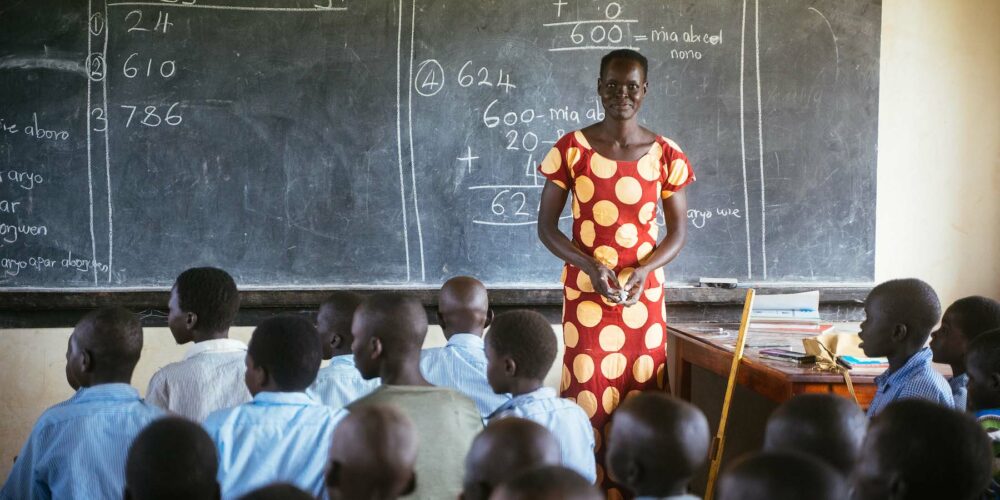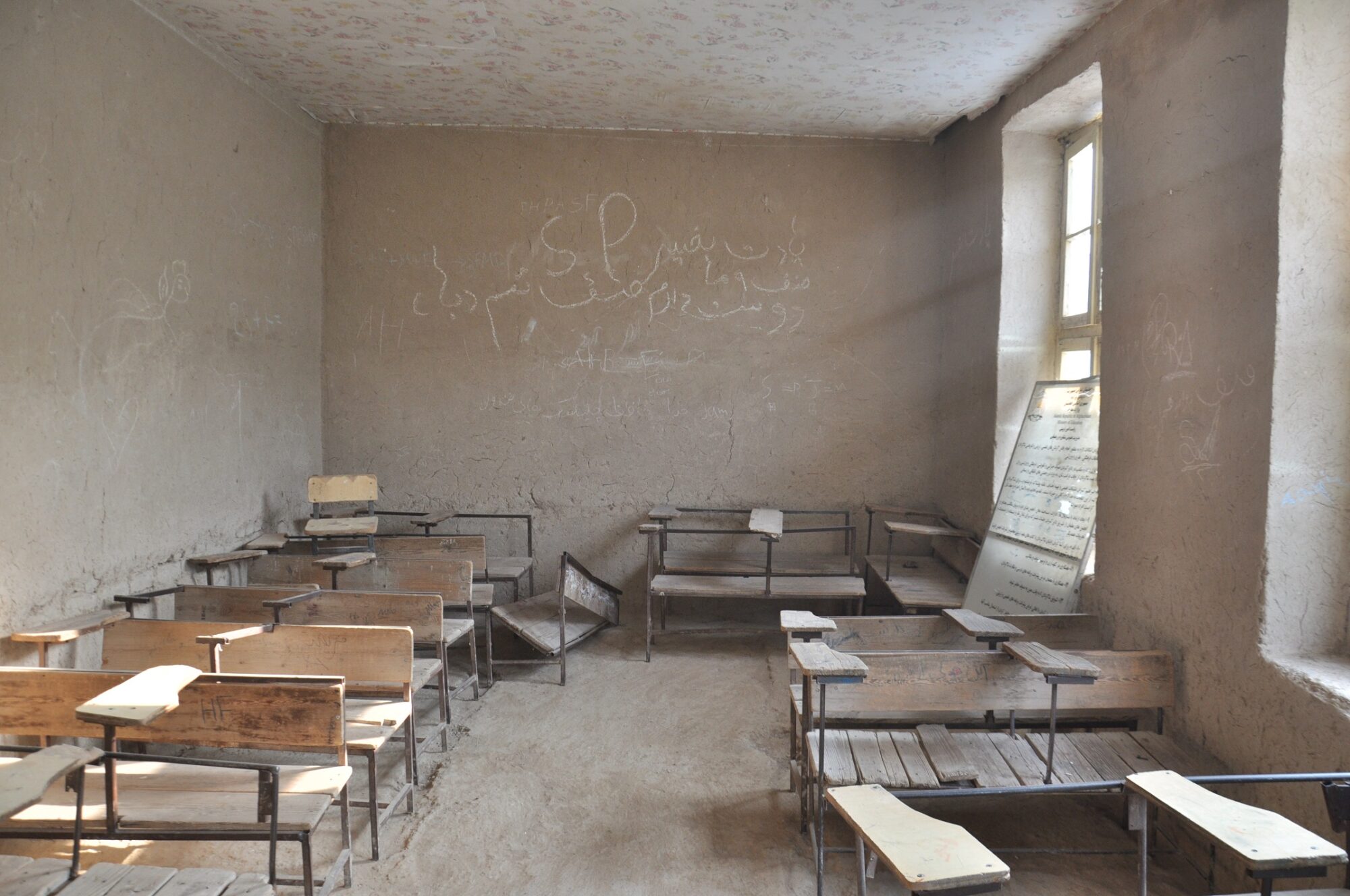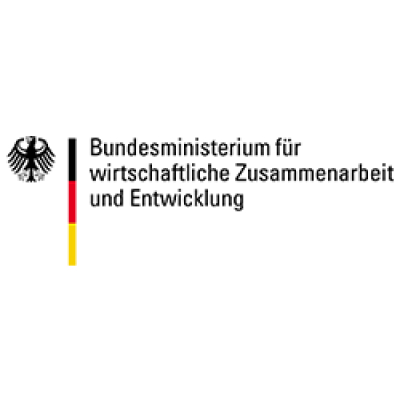
Khwaja Boghra primary and secondary school
Completed
Khwaja Boghra is considered one of the poorest neighborhoods in the Afghan capital Kabul. This is where the state primary and secondary school “Khwaja Boghra” is located, which is attended by more than 5,000 pupils. At the beginning of our work, the school lacked sufficient space and sanitary facilities. Structural defects and a lack of clean water endangered the children’s health. In 2015, we built 5 new classrooms within a year. Two years later, eight additional sanitary facilities were built. This measure also marked the start of our cooperation with our local partner VUSAF. This was followed by the joint planning of a total of 20 additional classrooms. These also include a fully equipped science laboratory, a computer room and four offices. Teachers also receive further training and workshops for science and IT lessons.
INITIAL SITUATION
Afghanistan is a landlocked country in South Asia with around 38 million inhabitants (as of 2020). A number of wars and political unrest over the last 40 years have left the country in a persistently unstable situation. The capital Kabul is located in eastern Afghanistan and is by far the most populous city in the country with 3.9 million inhabitants (as of 2017/2018). The numerous attacks, which have repeatedly claimed hundreds of victims, have left their mark on the everyday lives of the population and made the work of aid organizations more difficult. Nonetheless, the country and the children in particular need our support right now to give them courage and hope.
Our project is located in Khwaja Boghra, one of the poorest neighborhoods in the city. The residents mainly work in agriculture or in skilled trades – if they can find work at all. Khwaja Boghra is also characterized by a high proportion of child labour. This is often the case for the pupils at our project school, who have to work before or after school to support their families financially. The state primary and secondary school “Khwaja Boghra” was built in 2009. 2,621 girls and 3,095 boys, a total of 5,716 pupils aged 6-16, are registered at the school (as of 2019) and attend classes in three shifts. Before our involvement, the school had three buildings of different sizes with a total of around 20 classrooms and five latrines in a separate building. In summer 2015, our member Farhat Bafaiz traveled to Kabul to visit her family. Her aunt is a teacher at the school and asked Visions for Children e.V. for support, as the buildings not only offered far too little space, but were also in danger of collapsing in places. Farhat began the inventory and basic research during her stay.
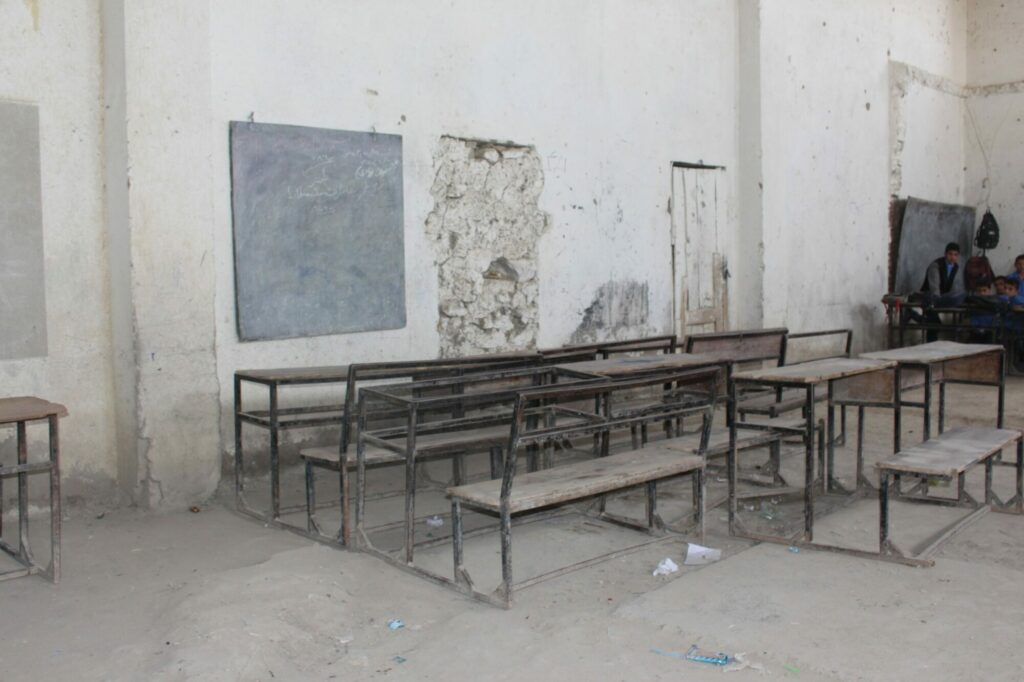
PROBLEM AND SOLUTION
The inventory was completed quickly. Two buildings had significant structural defects, which posed a danger to pupils and teachers. In addition, the classrooms were not big enough for the many pupils, which meant that many of them had to be taught outside in often unacceptable temperatures (up to +40 degrees in summer and +2 degrees in fall). With only five cubicles, the existing latrines were far from adequate and were in serious need of renovation. The lack of access to clean water also impaired school operations and the children’s learning success, as they suffered from severe thirst in summer.
The first step was to complete the construction of the five unfinished classrooms and fit them out. The measure was successfully completed at the beginning of 2016 and cost around €4,000.
After careful planning and preparation of the next steps, we realized the construction of eight gender-segregated, barrier-free sanitary facilities including hand washing facilities with clean drinking water at a cost of € 23,771.00 in 2017 with our local partner VUSAF. We received 75% of our funding from the German Federal Ministry for Economic Cooperation and Development (BMZ). Thanks to the optimized hygiene conditions, the pupils’ health, educational opportunities and learning success have improved ever since.
In 2017, we also provided the school with 15 weatherproof tents as part of an emergency aid measure to temporarily ease the acute lack of space. This has already increased class attendance. Of course, tents are only a temporary solution, which is why we tackled the expansion of the school with new buildings in several phases.
The construction of eight new classrooms began in 2018 in order to improve the quality of learning in suitable rooms. There was also a science laboratory and week-long workshops for science teachers. The project was successfully completed in summer 2019 and science subjects can now be taught in practice. The project costs for this phase amounted to around €185,000 and we received around 85% of our funding from the BMZ.
However, as there was still a shortage of classrooms, we started building a new classroom wing in August 2019. This was completed and fully equipped in January 2021. The building houses 12 furnished classrooms and four teachers’ rooms. The latter now enable teachers to prepare and follow up lessons thoroughly and in peace, which significantly improves the quality of teaching.
We also equipped a room in the new 8-classroom building as a computer lab right at the start. In October 2019, computer science courses were launched for pupils in the 8. and 9th grade. After a forced break due to the coronavirus, four groups (64 participants each) had already completed their computer courses by February 2021. The courses are led by professional trainers who introduce and support the responsible teachers for 16 months so that they can then take over the lessons independently. Computer science lessons are part of the national curriculum, but have not yet been able to take place due to a lack of materials and knowledge. This enables students to acquire important key qualifications that increase their chances of finding a good apprenticeship or further education. The total project costs for the 12 classrooms incl. IT courses amount to around €419,000 and the BMZ is subsidizing this project with around €290,000.
In addition, we were able to build a playground for the younger children at the school in summer 2020 with financial support from the Hamburg Senate Chancellery. This creates a place for pupils to relax and let off steam during breaks, which increases their ability to concentrate. This project cost around €4,000.
The infrastructure measures were completed in December 2020. After that, computer courses were held for a total of 384 pupils and 4 teachers until the end of March. The teachers were trained to continue the IT lessons prescribed in the curriculum. At the start of the courses, over 50% of participants aged between 14 and 17 had never worked with a computer before. In today’s world, this is fatal, as most further education and training programs require computer skills. In fact, before starting the courses, over 70% of participants expressed a career aspiration for which they needed this knowledge. For example as an engineer, doctor or teacher. After the courses, over 85% of the students even aspired to this. We are all the more pleased that the participants have come one step closer to this future perspective: Our surveys showed a significant improvement in Microsoft Office and other IT skills, such as knowledge of basic hardware components. This opens up new training and further education opportunities for students and paves the way for them to lead an independent, digitalized life.
In 2019, we began conducting surveys of pupils and teachers for the first time in order to better track the results of our activities, measure their impact and identify any modifications for follow-up projects. The initial results already showed an enormous increase in positive attitudes, hopes and motivation among some pupils as a result of the improved learning environment. At the end of the project in 2021, we plan to carry out an external professional evaluation to measure the impact of the entire project on the quality of teaching, attendance rates, learning success and motivation of pupils and teachers even more comprehensively.
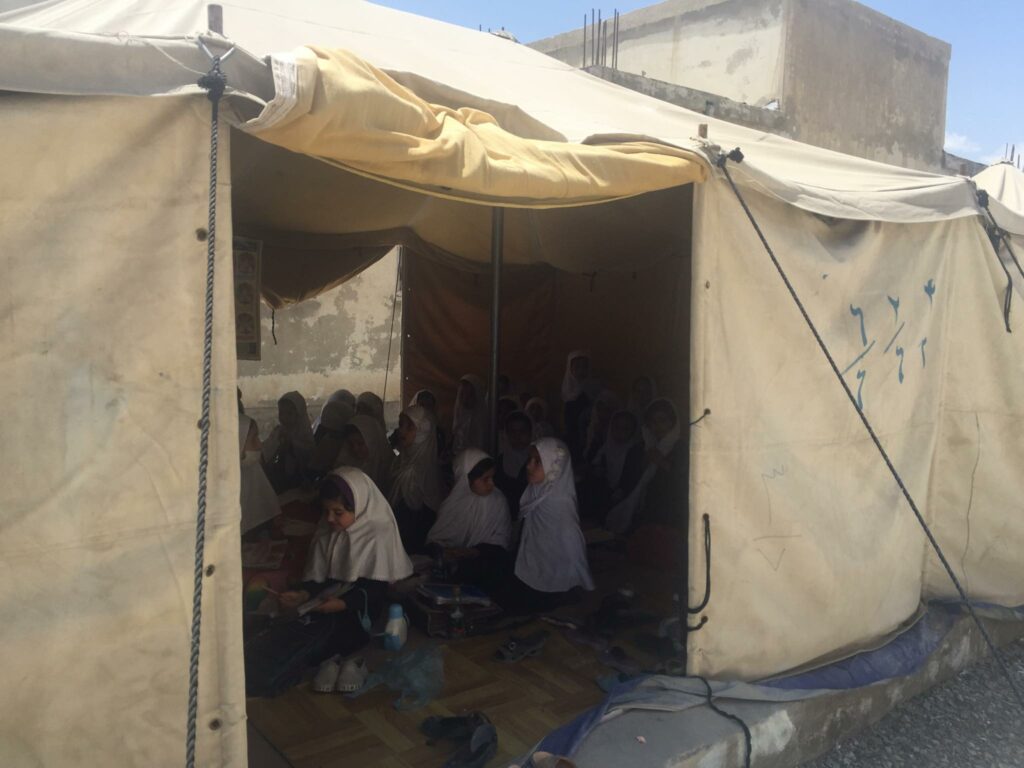
WHAT HAS BEEN ACHIEVED SO FAR



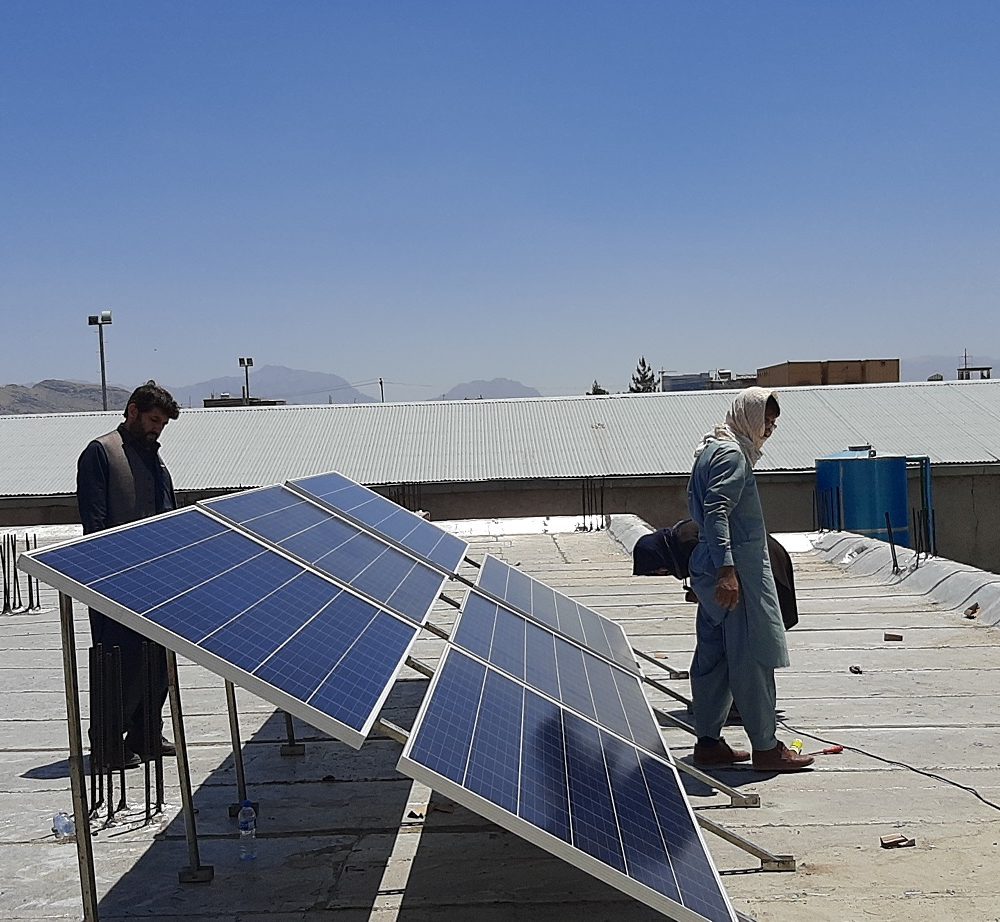


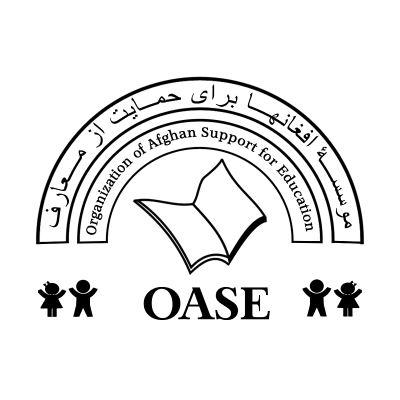


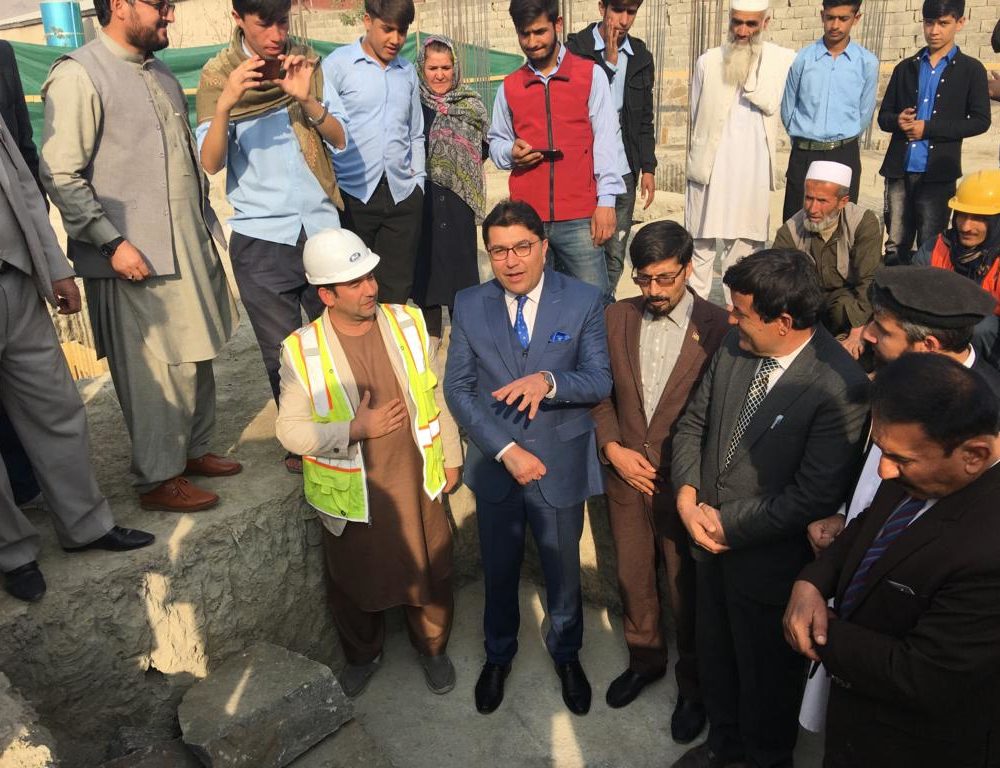
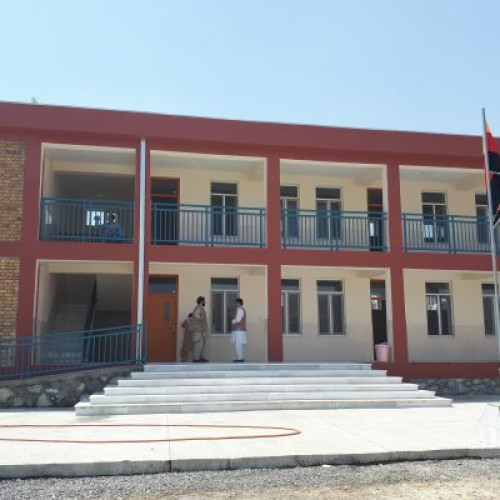

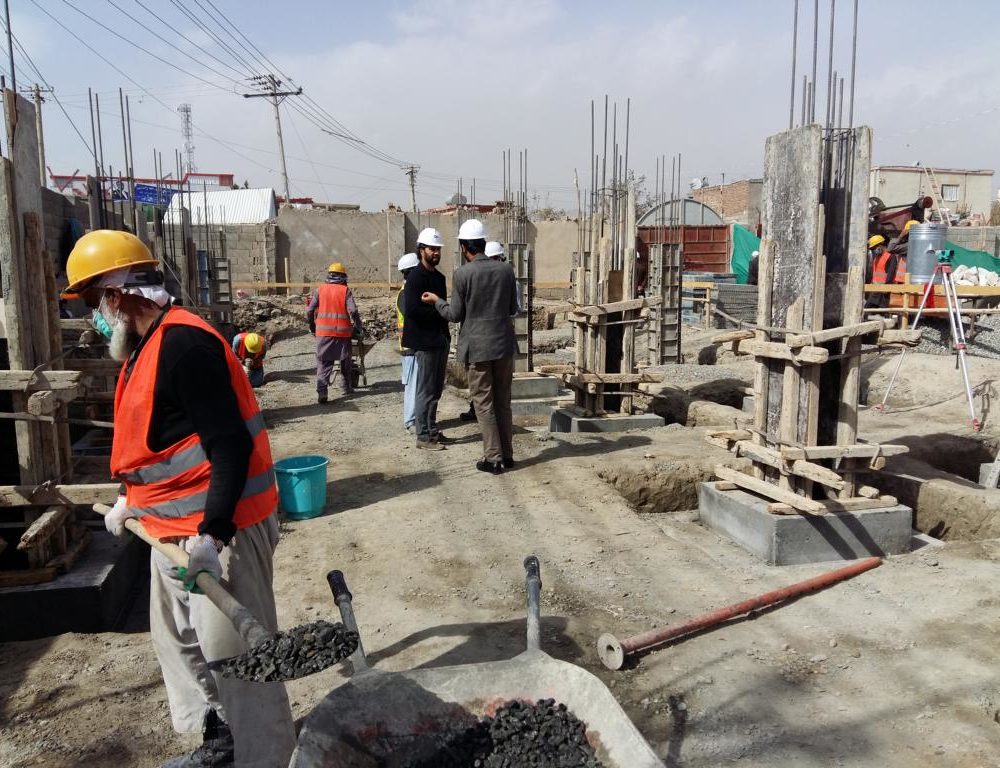


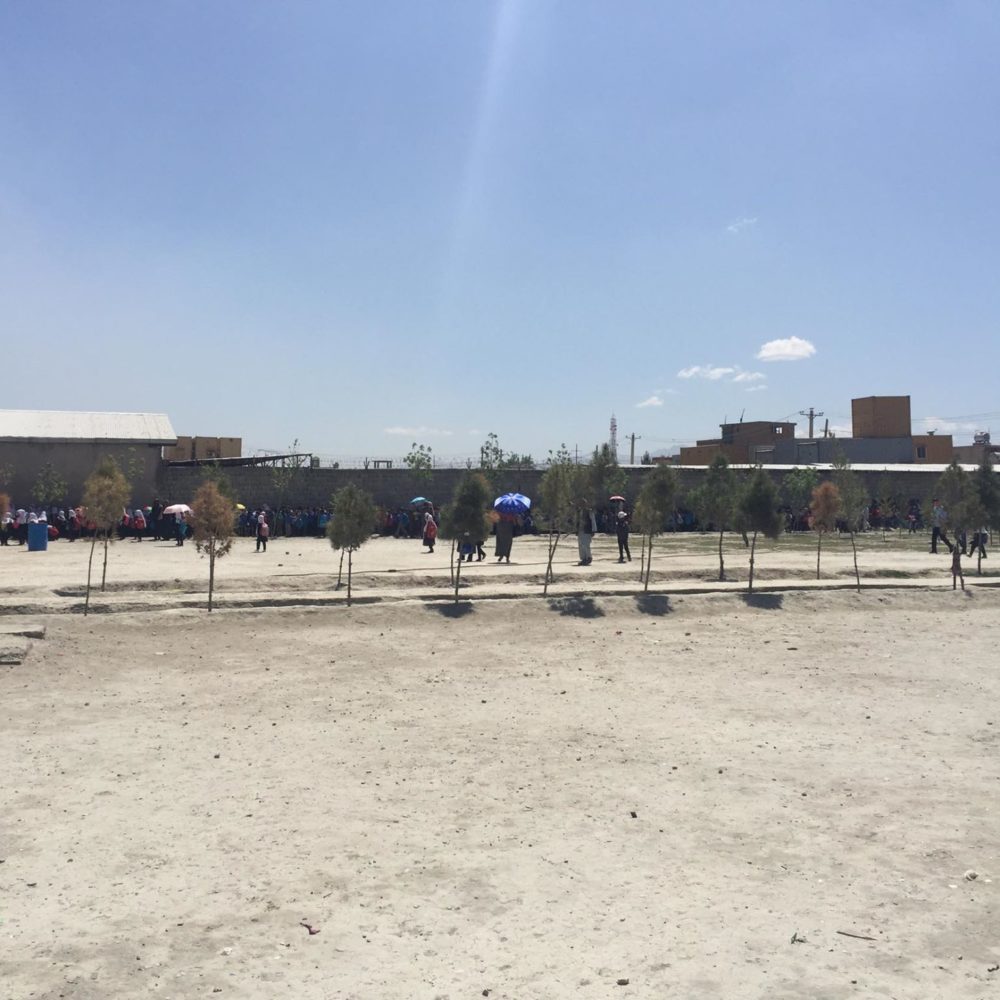

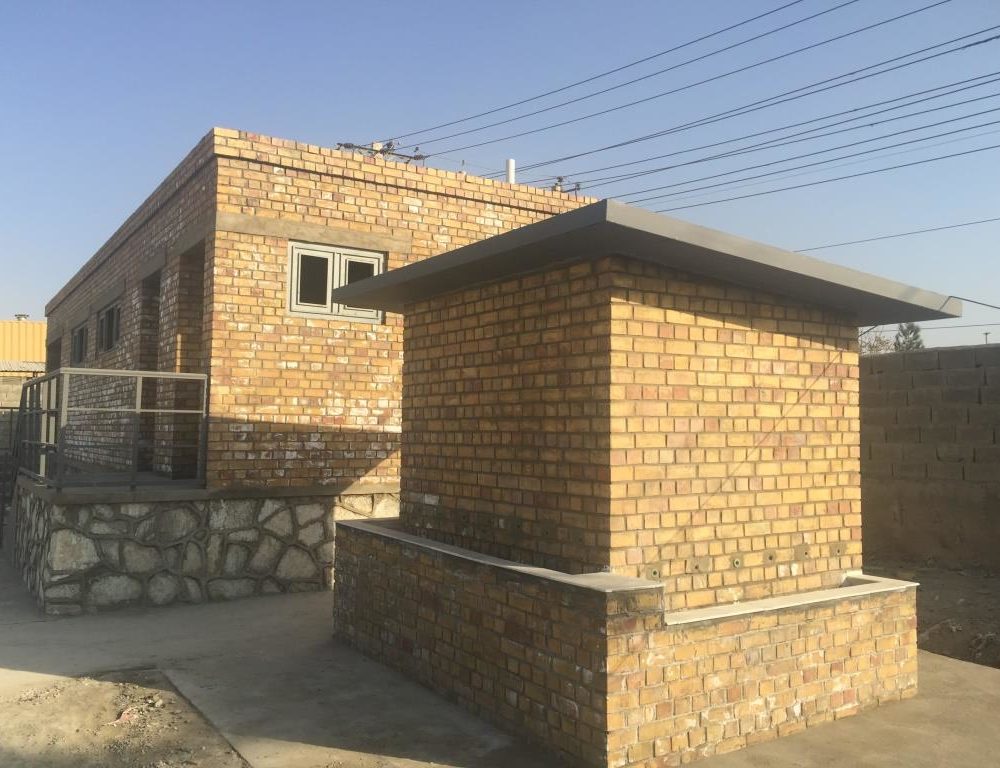
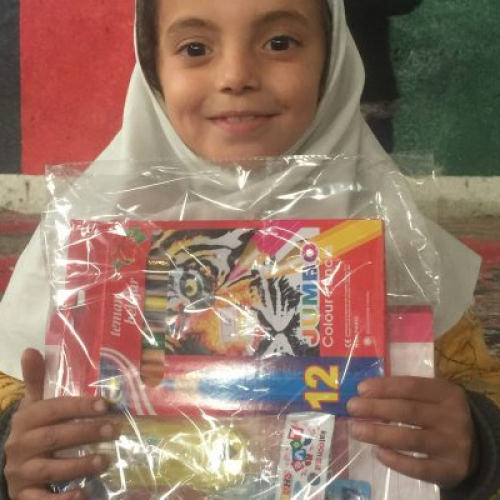
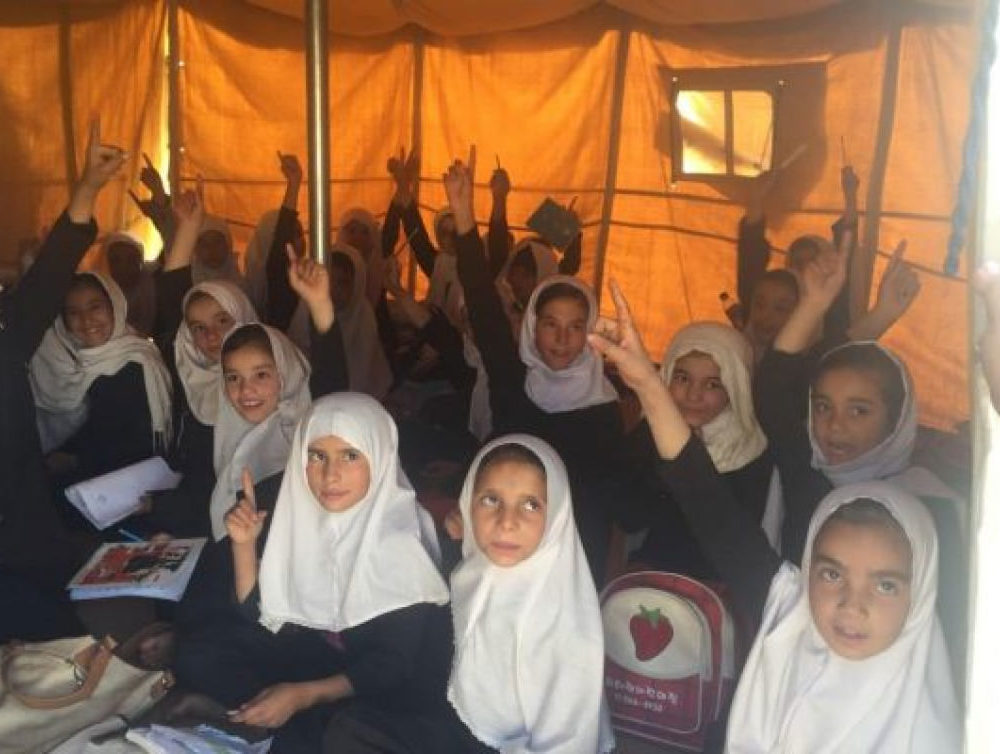
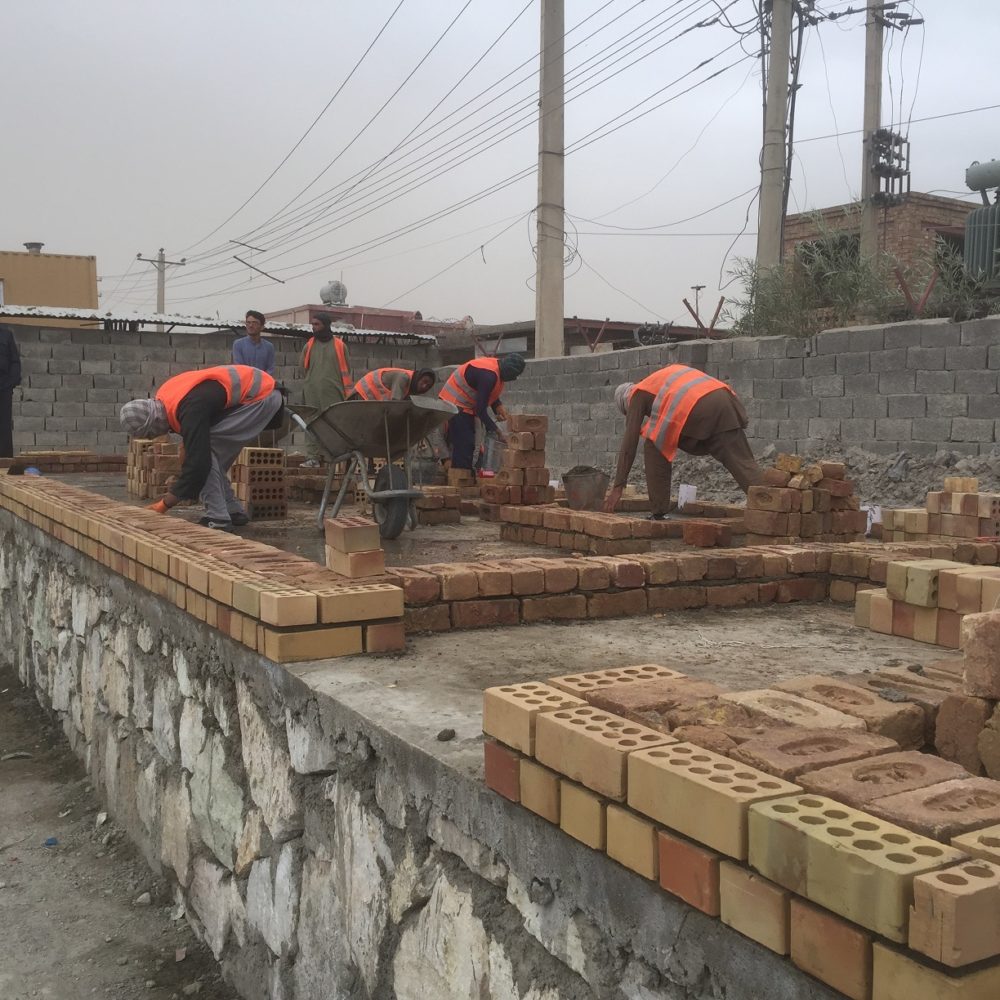
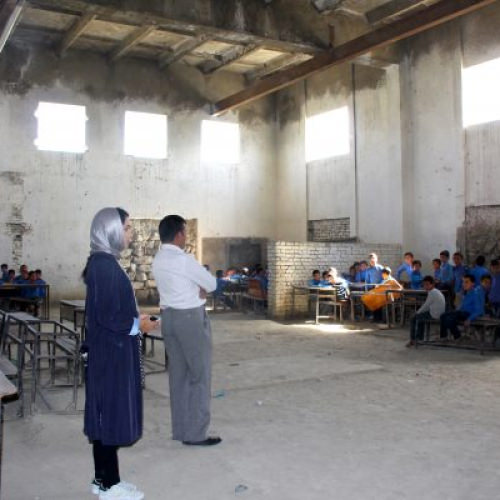

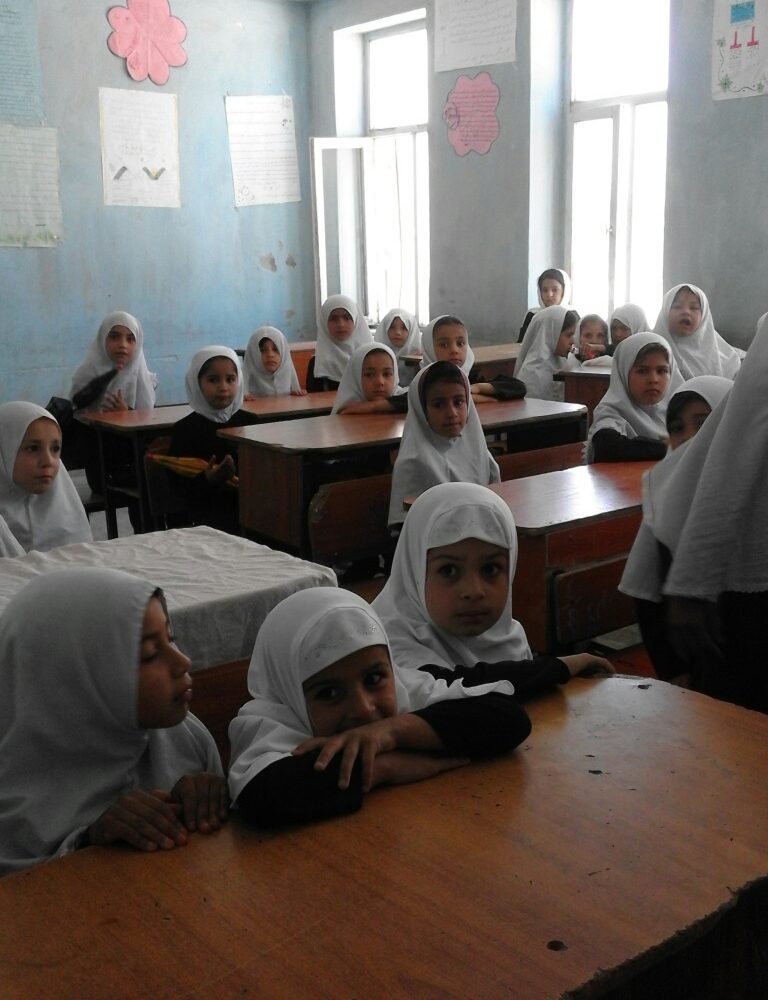
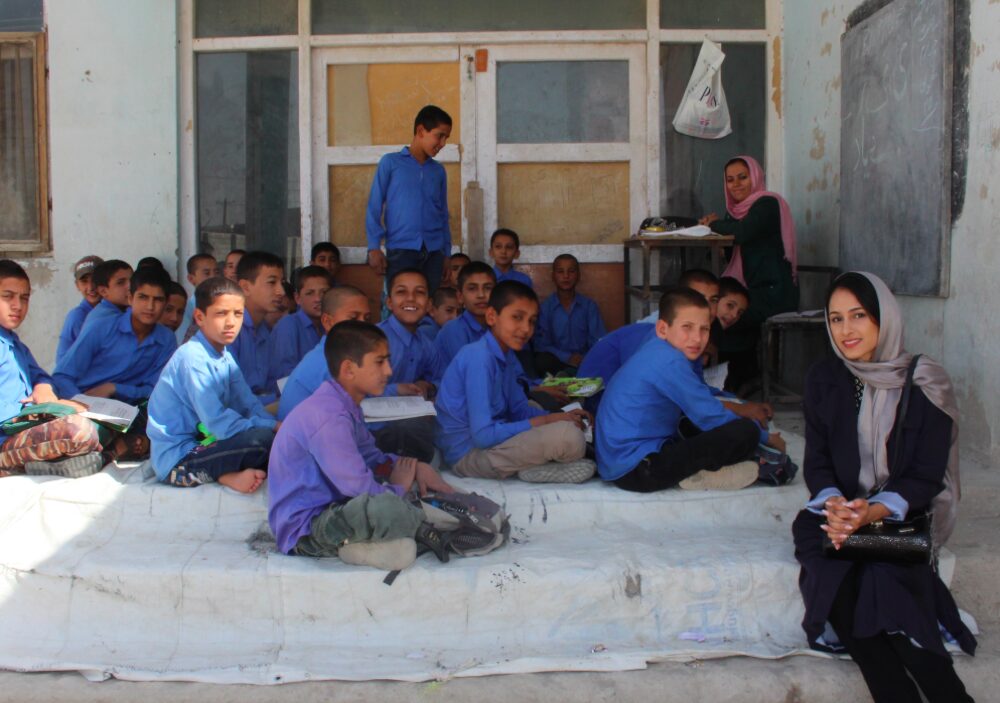
COMPLETION OF THE NEW BUILDING
The construction work for the new building with 12 classrooms and 4 administration rooms has been completed. The rooms have also already been furnished. In the next few weeks, the building will be officially handed over to the school and education authority by our local partners and will be inaugurated by the pupils after the winter vacations.
CONTINUATION OF THE COMPUTER COURSES
Unfortunately, most of the schools in Kabul are still closed, and only the higher graduating classes are gradually being allowed to attend classes again. Fortunately, we have received special permission for our computer courses. To make up for the lost time, we have doubled the number of groups per day so that 64 girls and 64 boys now receive IT lessons in at least 4 individual groups every day.
EVALUATION RESULTS
We have finally evaluated the surveys from the beginning and end of 2019 and have some great news! Most girls' attitudes and aspirations have improved, they seem more motivated to attend school and more confident in a better future through their educational opportunities. The expansion of the school into an adequate place of learning where all pupils feel comfortable therefore already seems to be having an effect.
INSTALLATION OF SOLAR PANELS
We have installed solar panels on the school roof to ensure a sustainable power supply for the computer courses.
SPECIAL BUILDING PERMIT
Our project partner has received a special permit and at least the construction of the 12 classes can go ahead.
SCHOOL CLOSURES IN THE WAKE OF THE COVID19 PANDEMIC
Of course, the coronavirus pandemic is not stopping at Kabul either - on the contrary: the city's residents are particularly at risk, as the Afghan healthcare system is quickly overloaded, hardly any testing is carried out and there is a lack of awareness of the virus in the city. There are also nationwide school closures in Afghanistan, our computer courses are interrupted and construction is halted for the time being.
VUSAF BECOMES OASIS
OASE is being formed from our previous project partner VUSAF. While VUSAF will focus on training and women's projects in the future, OASE will focus on educational projects like ours. However, the employees and our contact persons remain largely the same, so it is more of a formal change that will facilitate future professionalization.
ANOTHER PROJECT TRIP TO KABUL
Another project trip by CEO Hila Limar and member Winuss Azizi takes place. The two can use this opportunity to conduct the surveys from the beginning of the year again with a total of 200 girls and 50 boys. This provides us with a basis for comparing the results later and measuring any progress and impact of our activities.
START COMPUTER COURSES & LAYING THE FOUNDATION STONE
Computer courses also started at the beginning of October: a room in the new 8 building was equipped as a computer room with 16 laptops and other equipment. The foundation stone was also laid in a small ceremony at the end of October. In addition to pupils, teachers and head teachers, our local partner VUSAF and the Minister of Education were also present.
APPROVAL BMZ APPLICATION THIRD PARTY PROJECT
Our BMZ application is finally approved and nothing stands in the way of the start of the project for twelve classrooms and accompanying IT training courses.
INAUGURATION OF THE NEW 8 CLASSROOMS & NAWI WORKSHOPS FOR TEACHERS
It's done: on 25.07.2019, the new 8-classroom building was officially opened and handed over to the Ministry of Education. The next step is to prepare the proof of use for the BMZ. The science workshops for teachers also took place.
FIFTH PROJECT TRIP TO KABUL
As part of another project trip, Hila Limar visits the school again, this time accompanied by member Arthur Fedai. In addition to inspecting the progress of the construction work and talking to the school management and our project partner, we are also conducting a survey for the first time. At least 240 girls were asked about their daily school experiences and wishes in questionnaires and small discussion groups.
AFTER THE WINTER BREAK, CONSTRUCTION IS FINALLY PROGRESSING
After the cold winter and the associated break in construction, the building of the new eight classrooms is now progressing.
FOURTH PROJECT TRIP TO KABUL
Our CEO Hila Limar is traveling back to Afghanistan for the first time since her early childhood. She visits our project at the "Khwaja Boghra" school and is even allowed to attend the laying of the foundation stone. She will also have the opportunity to get to know the team of our project partner VUSAF personally.
BMZ APPLICATION SECOND PROJECT
After a few labor-intensive days, we finally submitted the application for our second project to the BMZ. Due to the acute lack of space, we want to start building a new classroom wing with eight classrooms from August 2018.
BMZ PROOF OF USE
We have finally submitted the completed proof of use, including cost accounts and photos, to the BMZ. The application for a second project in Kabul will now be submitted as quickly as possible.
PROJECT COMPLETION OF THE SANITARY FACILITIES
The sanitary and hand-washing facilities are finally finished. They will be officially handed over to the education authority on 26.12.2017. The only thing left to do is the official audit and we will now start to provide evidence to the BMZ.
THIRD PROJECT TRIP TO KABUL
Our member Salim Khamoush traveled to Kabul for ten days to see the progress of the project. The construction work is almost complete. Salim is also strengthening our personal contact with VUSAF and the MMCC.
HYGIENE WORKSHOPS WITH CIRCUS
As part of the sanitation project, pupils and teachers spent a day learning all about hygiene, health and nutrition. The Afghan Mobile Mini Circus for Children (MMCC) rounded off the day's program with a performance in keeping with the theme.
EMERGENCY SOLUTION: 15 NEW TENTS
Due to the acute lack of space, we are providing the school with 15 used weatherproof UNICEF tents. This means that pupils no longer have to be taught outdoors. The success of increased class attendance sets in quickly.
START OF CONSTRUCTION OF NEW SANITARY FACILITIES
After careful selection, the company PRIZMA was commissioned with the construction and the building site has been completed. The foundation stone was laid during a festive event and the construction of eight latrines and a hand-washing facility was successfully launched.
BMZ APPLICATION APPROVED
The BMZ approves our project application and approves the submitted costs. The construction of eight new toilets and a new hand-washing facility is due to begin in the fall.
FURNISHING FIVE CLASSES
The five classrooms have been completed and furnished with desks and benches
START OF CONSTRUCTION FIVE CLASSES
Construction work begins to complete the five classrooms.
INVENTORY
Our member Farhat is at Khwaja Boghra School for the first time and is taking stock. It immediately becomes clear that the school has a considerable need for classrooms. Many pupils are currently being taught in dilapidated rooms or even outside.

